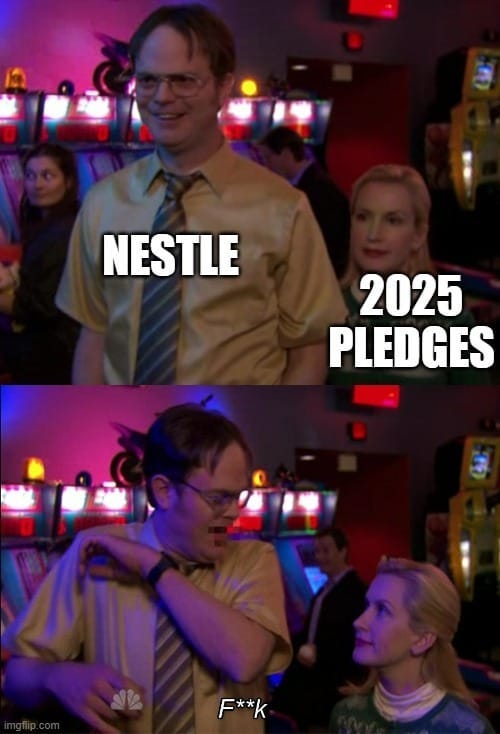🌱 The Grumpy Optimists #99
Gipsy Hill launch a carbon negative beer without any offsets...
Happy Monday. 👋
Welcome back to episode 99 of The Grumpy Optimists and a stressed grumpy optimist at that. Trying to move house, go on holiday and finish all of July’s work in a week is not the most ideal, so this is a slightly shorter episode I’m afraid.
This week, we’re looking at a fall in deforestation showing that political power makes a real impact, a breakthrough on shipping emission targets and Colplay reducing the impact of their world tour by 47%.
👀 Articles to read
🌴 Deforestation falls by 33.6% in Brazil. Deforestation in Brazil's Amazon has fallen by 33.6% in the first six months of President Luiz Inácio Lula da Silva's term. However, there is still a reported area three times the size of New York City lost since he came into power. However, progress is progress and this should be celebrated!
⚽ Football, fauna and flora working together. The FA has announced a new sustainability strategy called "Playing for the future" with one of the pillars being rewilding and restoring biodiversity around football pitches. Almost as important is that it will create a touchpoint between footballs across the country and nature.
🔋 Battery breakthrough could create 1,000km EV range. China-based Contemporary Amperex Technology Co. Limited (CATL), the world’s largest EV battery maker, has claimed to have made a breakthrough that will allow batteries to travel over 1,000 kilometres. CATL's new battery technology could revolutionise both long-distance electric car travel and electric passenger flight.
🎵 Viva la Sustainably, Coldplay go big on climate. A mainstay on my sleep playlist, Coldplay have released their latest sustainability report from their latest world tour and have made some pretty good progress. The tour produced 47% fewer CO2e emissions than their 2016-17 trip, it was powered by 100% renewable energy, over 5 million trees have been planted and thousands of pounds were donated to climate causes. Whether you like their music or not, they’re setting the benchmark for making music tours more sustainable.
🔥 Four hottest days on record in one week. Unfortunately, a little bit of grumpy news as the earth recorded its hottest day on record on Thursday, July 6, with the global average temperature reaching 17.23°C (63.02°F), which is 1.02°C (1.8°F) above the average for the date. This is the fourth straight day to set or tie the record for warmest day globally. The extreme heat is been driven by both climate change and a strengthening El Niño event in the Pacific Ocean and is a sign of where we are heading. The planet is heating up, we have limited time to take action but we still have time to make a difference.
🚢 Global shipping industry anchors in their climate targets, but are they enough? International shipping is responsible for around 2% of global emissions and as it is not included in any country’s emissions and often avoids scrutiny. This week, world leaders came together to reduce the carbon intensity of international shipping by 40% by 2030, and to cut total emissions by at least 20% by 2030. Critics say this is not enough to reach net zero and the use of intensity and not absolute targets does not help reduce the production of emissions just simply reduces the amount per km travelled.
🇪🇸 Spain is set to become Europe's green energy poster child. The country has a unique combination of natural resources and manufacturing capabilities that make it an ideal location for the production of renewable, green hydrogen, with €18bn earmarked to help Spain become the Saudi Arabia of hydrogen. Meanwhile, in Spain, floods have led to pretty horrific scenes of people holding on to their cars while they’re being swept away.
📊 Climate Tech funding down 40% in 2023. Climate Tech VC found that the overall funding amount for climate tech companies is down by 40%, but the good news is that more is being invested into seed-stage companies and overall venture funding is down 53%, so it could be worse. This is a fantastic report from a great company.
🍺 Gipsy Hill launches a carbon negative beer without any offsets in partnership with Wildfarmed and Zevero (that’s me). The beer is made with regenerative barley and is currently only carbon negative in a keg. You can read more about it here. This is not a greenwashing episode, it’s truly a showcase of how companies can change their supply chains to create products that promote biodiversity, reduce carbon and make financial sense. Watch my co-founder Ben and the brilliant team on the video below.
🤝 Memes x Climate
This week Nestlé announced that it will stop using carbon offsets and remove carbon neutral pledges from some of its products to instead focus on cutting emissions in its supply chain.
This week’s episode was written after a long weekend of enjoying great music, sleeping less than is optimal but also being very happy with a final garden haul before I have to leave it all behind and move house this week.
Lots of love,
George, the Grumpy Optimist 💚





